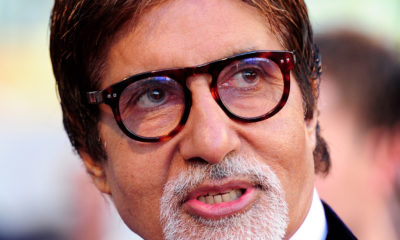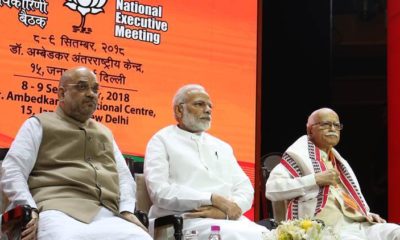National
India’s climate action plan ambitious, progressive: Javadekar

New Delhi: India’s climate action plan submitted to the United Nations is “comprehensive, ambitious and progressive” which will help reduce emission intensity by 33 to 35 percent by 2030, Environment Minister Prakash Javadekar said on Friday.
“The plan submitted by India is comprehensive, ambitious and progressive. India targets to reduce the emission intensity by 33 to 35 percent in the next 15 years and will curb 3.59 billion tonnes of carbon emissions by 2030,” he said at a press conference here.
Emission intensity refers to the ratio of a country’s emissions to its economic output.
Ahead of the crucial 21st meeting of the Conference of Parties (CoP-21) under the United Nations Framework Convention on Climate Change to be held in Paris from November 30 to December 11, India has made a 38-page submission under what is called the Intended Nationally Determined Contributions (INDCs).
The deadline to submit the INDCs was October 1, 2015 and India kept the deadline as well as it coincided with the birth anniversary of Mahatma Gandhi on October 2 by submitting it after midnight, Javadekar said.
“Much before the climate change debate began, Mahatma Gandhi had said that we should act as ‘trustees’ and use natural resources wisely as it is our moral responsibility to ensure that we bequeath to the future generations a healthy planet,” he said.
Javadekar said India has pledged for eight major goals, including a target of generating 40 percent of electricity from renewable sources by 2030. “Its a huge target that will help in curbing the global warming,” he said.
The minister said India’s INDCs focuses on various elements — mitigation, adaptation, finance, technology transfer and capacity building.
Stating India’s plan was synchronized with the country’s development agenda, the minister said: “India faces enormous development challenges like poverty eradication, ensuring housing, electricity, good health and food security for all.”
He said it was a pressing need to chart a path of growth that was less harmful to the environment without sacrificing the country’s aspirations.
Saying India’s climate actions have largely been financed from domestic resources, he said implementing climate change mitigation and adaptation actions would require domestic and new and additional funds from developed countries in view of the shortage of resources.
Although India was not a large pollution generating country as compared to the developed world, the minister said the country had taken a pledge to save the environment from global warming.
“India is not a part of problem, but it is a part of solution,” he said.
National
Foodman Vishal Singh Honored for Hunger Free World Mission in Bangkok

Lucknow: Vishal Singh, a renowned social worker from Lucknow, also known as Foodman, has once again made India proud. He was honored by the Happy Hands Gloves Cooperative Limited Company in Korathai, Thailand, for his work with the Hunger Free World Mission.
The Hunger Free World Mission’s meeting was held in Korathai, Thailand, under Vishal Singh’s leadership. Representatives from several countries, including Mr. Raja Dwivedi (Managing Director of Happy Hands Gloves Limited), Thailand Coordinator Mr. Raja Mishra, and member Mr. Varun Singh, attended the event.

Under Vishal Singh’s leadership, the attendees took a pledge to work together toward creating a hunger-free world.
Speaking on the occasion, Vishal Singh explained that the main goal of the Hunger Free World Mission is social participation. He said the mission is not just about feeding people but also about meeting other basic needs of those who are struggling. The mission focuses on helping families of terminally ill patients in hospitals by providing food and shelter. It also works to fulfill essential needs like education, jobs, and care for the elderly.
For the last 16 years, the Vijay Sri Foundation has been providing free services, benefiting thousands of people. Vishal Singh highlighted that the mission aims to gain global recognition like other organizations such as WHO, WWF, and Red Cross, which work for social causes.
During this meeting, Vishal Singh was appointed as the Chairman of the Hunger Free World Mission by representatives from various countries. They also discussed holding regular meetings in different countries to push the mission forward.
Business tycoon Dr. Abhishek Verma has also supported this humanitarian mission, vowing to promote the idea of “Seva Parmo Dharma” (Service is the highest duty) worldwide. Vishal Singh praised him, stating that people like Dr .Abhishek Verma inspire others to work for the betterment of society.
Recently, Romania’s Ambassador, Mr . Daniela Sezonov Ţane, invited Vishal Singh to the Romanian Embassy in Delhi, where they discussed the mission in detail. Impressed by his humanitarian work, she honored Vishal Singh and invited him to Romania to take the mission forward .
Food man Vishal Singh has been serving the people of India for the past 16 years. Through the Vijay Sri Foundation, he provides free meals to cancer patients & their families ,shelter, and education for women & children along with running free old-age homes in Lucknow.
In addition to his humanitarian work, Vishal Singh also addresses issues like crime and corruption through his role as Chairman of Seva Path Media and Managing Director of Vijay Sri Foundation.

During the COVID-19 pandemic, Vishal Singh and his team worked tirelessly to provide food and help to the needy, including starving children, elderly citizens, and pregnant women. Despite contracting the virus himself, he continued to assist others after his recovery. He even created a life-saving oxygen regulator using household items, which was praised by doctors both in India and abroad.
In his address at the meeting, Vishal Singh spoke about his mission to create a hunger-free world. He pointed out that India’s large population, along with issues like unemployment and poverty, has caused the country to fall on the Hunger Index. He urged people to contribute just one handful of grains daily to help create a hunger-free world.
He concluded by saying that through social participation, we can empower the people around us, meet their basic needs, and work together to build a stronger, more prosperous, and developed society.























